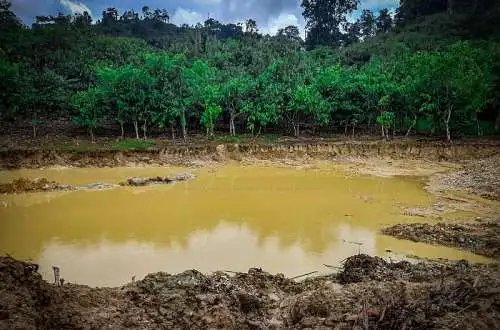Twin Threats Loom Over Ghana’s Cocoa Sector: Metal Residue Contamination and EU Deforestation Regulation
High levels of metal contamination have already been detected in certain root crops, raising fears that cocoa beans could face similar issues.
- Advertisement -
Ghana’s cocoa industry, already facing significant challenges, could be further strained by two imminent threats: the potential presence of heavy metal residues in cocoa beans due to illegal mining, and the fast-approaching European Union (EU) Deforestation Regulation deadline.
Metal Residue Contamination
- Advertisement -
Stakeholders in Ghana’s cocoa industry are increasingly concerned about the detection of heavy metals in cocoa beans, which could severely impact the country’s reputation for producing some of the world’s finest cocoa. These metal residues, believed to stem from illegal mining (locally known as “galamsey”), pose a serious threat to cocoa crops in affected areas. High levels of metal contamination have already been detected in certain root crops, raising fears that cocoa beans could face similar issues.
- Advertisement -
A study, that evaluated the concentration of potentially toxic metals in different parts of the cocoa plant and fruit, in relation to mining activities within an area, showed that these metals are able to move from the soil to cocoa leaves and beans. Furthermore, the results show the concentrations of toxic metals in the different parts of the cocoa fruit and plant, particularly in the cocoa bean. In this particular study conducted in Latin America, the concentration of these metals did not exceed the safety standard.
However if excessive metal levels are found in Ghanaian cocoa, the beans could be rejected by international buyers, leading to a devastating blow to the country’s export earnings. The heightened scrutiny has already resulted in more rigorous certification processes for fruits and vegetables from Ghana, adding costs for farmers. These additional expenses could soon affect the cocoa sector as well.
EU Deforestation Regulation
The second looming threat is the EU’s Deforestation Regulation, set to take effect in December 2024. This regulation requires companies importing key commodities, including cocoa, to ensure that their products do not contribute to deforestation or forest degradation, or violate local environmental and social laws. Companies that fail to comply could face fines of up to 4% of their turnover.
- Advertisement -
The regulation also mandates that products be traceable to their source. Ghana is already piloting a cocoa bean traceability system from farm to port to meet these stringent requirements. However, the ongoing practice of galamsey presents a significant hurdle. Illegal mining leads to deforestation and the destruction of cocoa farms, clearly violating the EU’s environmental rules. The contamination of cocoa beans further complicates Ghana’s ability to meet the new regulatory standards, potentially leading to trade restrictions or price penalties for Ghana’s cocoa.
Global Cocoa Shortage Offers Temporary Relief
Despite these risks, Ghana may escape the worst consequences, thanks to a global cocoa shortage. Over the past year, cocoa prices surged from a regular level of $3,000 per tonne to an unprecedented $12,000 before stabilizing at around $7,000. Recent floods in West Africa have reduced harvests, pushing prices even higher.
Given the low production levels and soaring prices, it would be difficult for the global market to reject Ghana’s cocoa, as doing so would exacerbate the shortage and send prices skyrocketing. While Ghana could face minimal sanctions or penalties, the global demand for cocoa is so high that the international market may be reluctant to enforce strict measures.
Many industry analysts believe that the current global silence on the impact of illegal mining on Ghana’s cocoa is due to this shortage. As the world’s second-largest cocoa producer, any disruption to Ghana’s supply would destabilize the global chocolate industry, leading to higher prices, potential company closures, and increased unemployment in the sector.
While Ghana’s cocoa sector faces serious risks from metal contamination and new EU regulations, the global cocoa shortage may shield the country from severe sanctions in the short term. However, long-term solutions will require urgent action to address the root causes of illegal mining and deforestation in cocoa-growing regions.
Source:thehighstreetjournal.com
- Advertisement -


